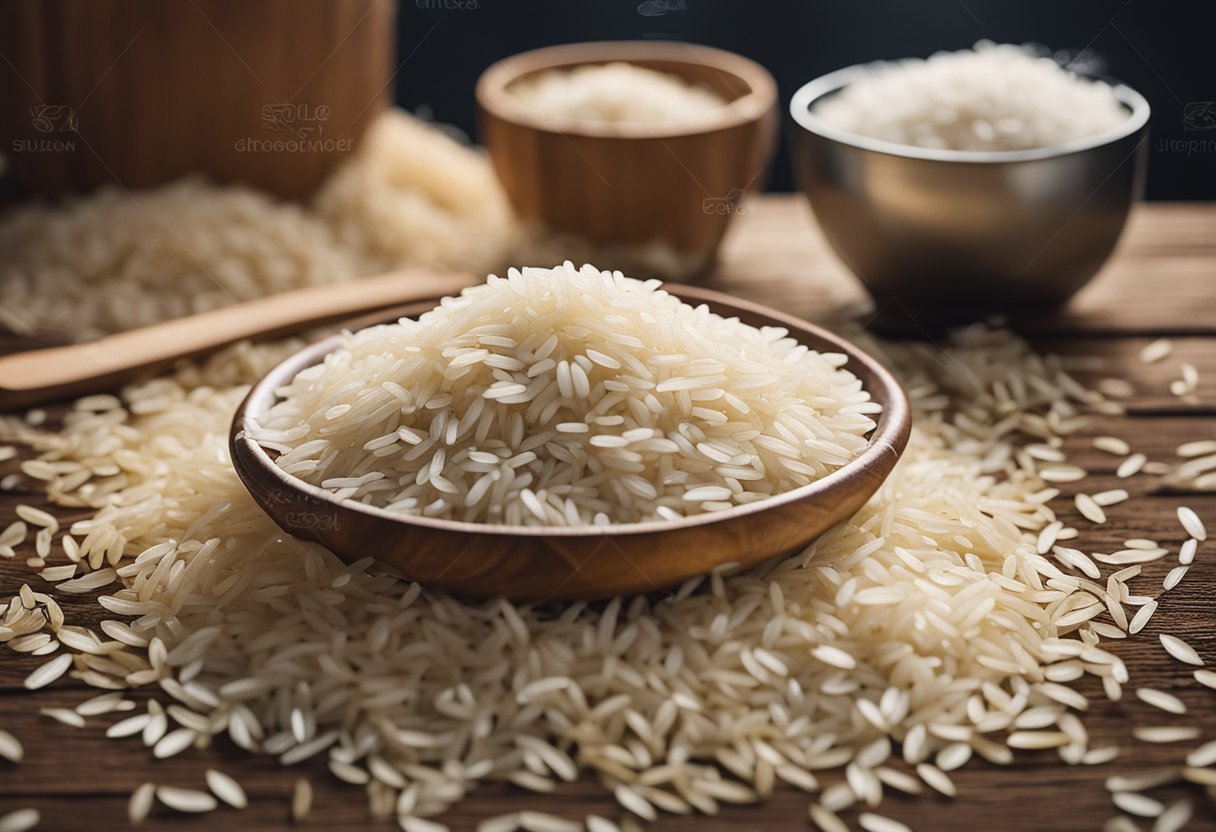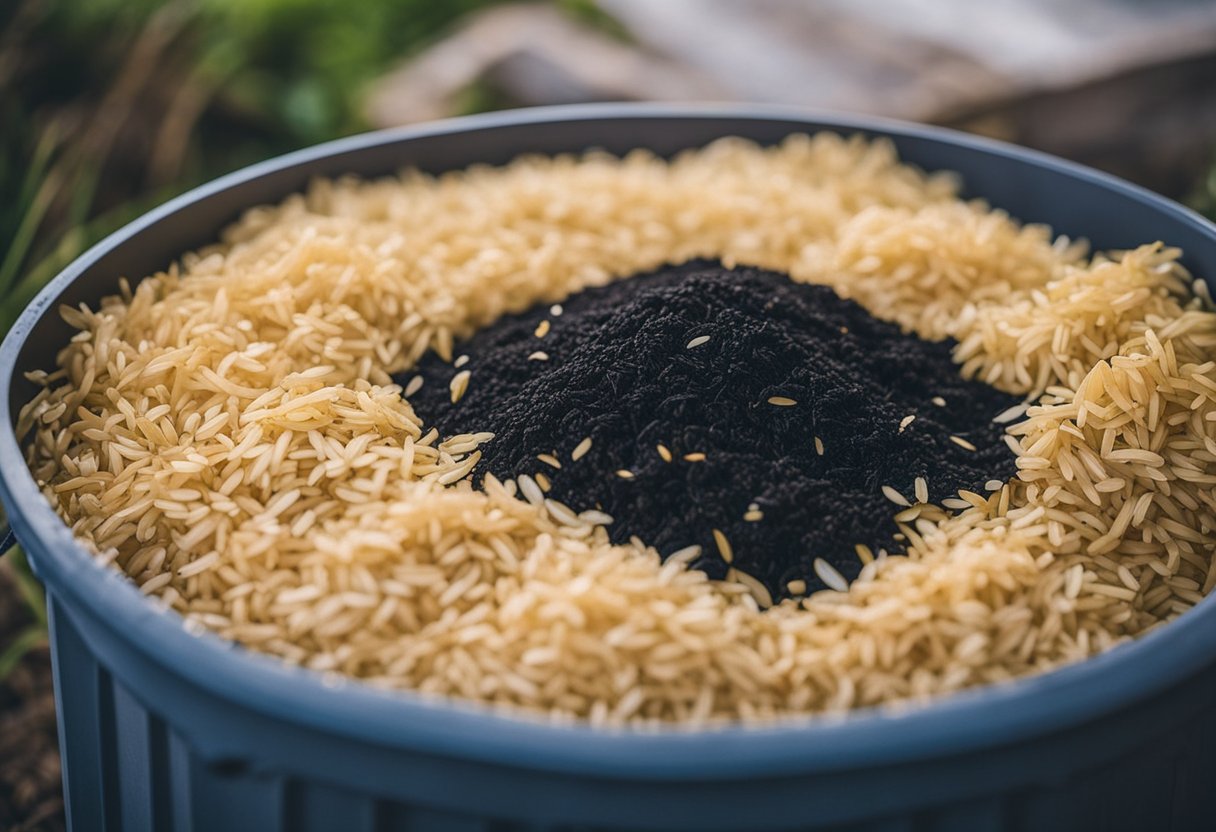As an Amazon Associate I earn from qualifying purchases.
At A Glance
Yes, you can compost uncooked rice. Uncooked rice is an organic material that will break down in a compost pile over time. However, it may attract pests if not properly managed, so it’s advisable to bury it well within the compost pile. Additionally, rice can take a while to decompose, so breaking it down into smaller pieces or soaking it in water to soften before adding to the compost may expedite the process.
Composting is an excellent way to reduce waste and create nutrient-rich soil for your garden. However, not all food waste is suitable for composting. One common question that people ask is, “Can you compost uncooked rice?” The answer is yes, but there are some things you need to know before adding uncooked rice to your compost pile.

Uncooked rice is a biodegradable material that can enrich your compost pile with organic matter. It is a natural material that will decompose in a compost pile, adding essential nutrients to the soil. However, adding too much uncooked rice to your compost heap can attract rodents and insects. Therefore, it is better to add just tiny amounts of rice to avoid overdoing it and to avoid trouble.
If you have a hot compost pile, adding uncooked rice is just fine. In a hot compost pile, the high temperatures will break down the rice quickly, and it won’t attract pests. However, if you have a cold compost pile or a covered bin, it’s best to add rice sparingly. This will prevent the rice from taking too long to decompose and attracting rodents and pests.
Understanding Composting
Composting is the process of breaking down organic material into a nutrient-rich soil amendment that can be used to improve soil health and plant growth. This process is achieved through the action of microorganisms, which break down the organic matter into a stable and usable form.
There are several ways to compost, including using a compost pile, compost bin, or compost heap. The key to successful composting is to create the right conditions for the decomposition process to occur. This includes providing the right balance of organic matter, moisture, and air, as well as maintaining the right temperature and carbon to nitrogen ratio.
The decomposition process is driven by microorganisms, which require oxygen to survive. As organic matter breaks down, it generates heat, which can help to speed up the process. However, if the compost pile gets too hot, it can kill off the microorganisms, which can slow down the process.
To ensure that the microorganisms have enough oxygen, it is important to turn the compost regularly. This helps to aerate the compost pile and ensure that all of the organic matter is exposed to the microorganisms.
When composting, it is important to balance the amount of carbon and nitrogen in the compost pile. Carbon-rich materials, such as leaves and straw, provide the energy source for the microorganisms, while nitrogen-rich materials, such as food scraps and grass clippings, provide the protein source. The ideal carbon to nitrogen ratio for composting is between 25:1 and 30:1.
Hot composting is a method of composting that involves maintaining a high temperature in the compost pile. This can help to speed up the decomposition process and kill off any weed seeds or pathogens that may be present in the compost pile. Hot composting requires a larger amount of organic material and a higher level of management than other methods of composting.
The Role of Rice in Composting
Rice is an organic matter that can be composted. Both cooked and uncooked rice can be added to compost piles, but uncooked rice takes longer to decompose than cooked rice. When composting rice, it is best to do so at home as rice can attract pests.
Raw rice can go straight into your compost pile, but it is important to note that the longer decomposition period of uncooked rice compared to softer organic matter can be a challenge. Bacterial growth, pesky pests, and pungent odors have been associated with composting rice, making it a less than ideal ingredient for some composters. However, proper preparation and optimal composting conditions can minimize these risks.
Brown rice can last up to six months in an air-tight sealed container, and it can still be composted even if it has gone past its expiration date. Rice water, the starchy water left over after rinsing rice, can also be added to compost piles as it contains nutrients that can benefit your plants.
In summary, rice can be composted, but certain measures should be taken to ensure safe composting activity. Composting uncooked rice is an eco-friendly way to dispose of leftover or expired rice while benefiting your garden.
Potential Risks and Precautions

When composting uncooked rice, there are a few potential risks and precautions to keep in mind. One of the main concerns is attracting pests and rodents. Rice is a starchy food, and if added in large quantities, it can create clumps or attract pests like rodents or insects. To prevent these issues, it’s recommended to add just tiny amounts of rice to avoid overdoing it.
Another risk to consider is the growth of harmful bacteria. Rice can be a breeding ground for bacteria, which can create unpleasant odors and make the compost unsafe to use. To avoid this, it’s important to ensure that the compost pile reaches the proper temperature and is turned regularly to ensure proper aeration and decomposition.
In addition to these risks, there are also some common composting mistakes that should be avoided when composting rice. For example, adding too much rice at once can create clumps that are difficult to break down and can slow down the composting process. It’s also important to avoid adding any rice that has been cooked with oil or other ingredients, as this can create an imbalance in the compost and attract pests.
Overall, composting uncooked rice can be a great way to reduce waste and create nutrient-rich soil for your garden. However, it’s important to take precautions to avoid attracting pests and harmful bacteria, and to avoid common composting mistakes. By following these guidelines, you can create a healthy, thriving compost pile that will benefit your garden for years to come.
Sure, here’s the section you requested:
Composting Other Kitchen Waste
I compost a lot of kitchen waste in addition to uncooked rice. Vegetable peels, stale leftover rice, and leftover pasta are all great additions to a compost pile. However, there are some kitchen scraps that should not be composted, such as dairy products. These can attract pests and create unpleasant odors.
When composting kitchen waste, it is important to maintain the proper balance of carbon and nitrogen. Carbon-rich materials include dry leaves, straw, and newspaper, while nitrogen-rich materials include fruit and vegetable scraps, grass clippings, and coffee grounds. Aim for a ratio of roughly 30 parts carbon to 1 part nitrogen.
If you’re new to composting, it’s a good idea to start small and work your way up. A simple compost bin or pile can be made from a sturdy plastic container or a wooden box. Be sure to turn the compost regularly to keep it aerated and moist.
In summary, composting kitchen waste is a great way to reduce your household’s environmental impact and create nutrient-rich soil for your garden. Just be sure to avoid composting dairy products and maintain the proper balance of carbon and nitrogen.
Composting Techniques
When composting uncooked rice, it is important to ensure that the rice is broken down into smaller portions and mixed with green materials to maintain proper moisture and aeration. There are several techniques that can be used to compost uncooked rice, including:
Hot Compost Pile
Adding uncooked rice to a hot compost pile can speed up the decomposition process and reduce the risk of attracting rodents and pests. The high temperatures in the pile can help to break down the rice quickly and efficiently, making it an ideal method for composting large quantities of rice.
Covered Bin
Another option is to add uncooked rice to a covered bin. This can help to keep rodents and pests away while still allowing the rice to decompose naturally. It is important to ensure that the bin is properly ventilated and that the rice is mixed with other compostable materials to maintain proper moisture and aeration.
Vermicomposting
Uncooked rice can also be added to a worm bin for vermicomposting. Red wiggler worms can help to break down the rice quickly and efficiently, producing nutrient-rich castings that can be used as fertilizer. It is important to moderate the amount of rice given to the worms to avoid issues like mold.
Bokashi Bin
A bokashi bin can also be used to compost uncooked rice. This method involves fermenting the rice with a combination of hydrated white lime and urea to create an anaerobic environment that promotes decomposition. The fermented rice can then be added to a closed compost bin or buried in the garden to complete the composting process.
Other Compostable Materials
When composting uncooked rice, it is important to mix it with other compostable materials to maintain proper moisture and aeration. This can include dried leaves, cardboard, coffee grounds, and other organic waste with high fiber content.
Overall, there are several effective techniques that can be used to compost uncooked rice. By following these techniques and maintaining proper moisture and aeration, it is possible to efficiently turn rice into valuable compost.
Benefits of Composting Rice
Composting uncooked rice has numerous benefits for your garden and the environment. When rice is added to compost, it breaks down into nitrogen-rich organic matter, which is an essential nutrient for plant growth.
Composting rice can also help to create a natural fertilizer that can be used to improve soil health. The nutrients and minerals in the compost can help to promote healthy plant growth and produce higher yields.
In addition, composting rice is an eco-friendly way to reduce food waste and divert it from landfills. When food waste is sent to landfills, it breaks down and releases methane, a potent greenhouse gas. By composting rice, you can help to reduce the amount of food waste that ends up in landfills and reduce your carbon footprint.
Rice can be used as both a green and brown compost material, depending on whether it is cooked or uncooked. Uncooked rice is considered a brown material, while cooked rice is a green material. When adding rice to compost, it is important to grind it up to help it break down more quickly.
Composting rice is a simple process that can be done at home or through a municipal compost system. By adding rice to your compost, you can help to create a nutrient-rich soil amendment that will benefit your garden and the environment.
